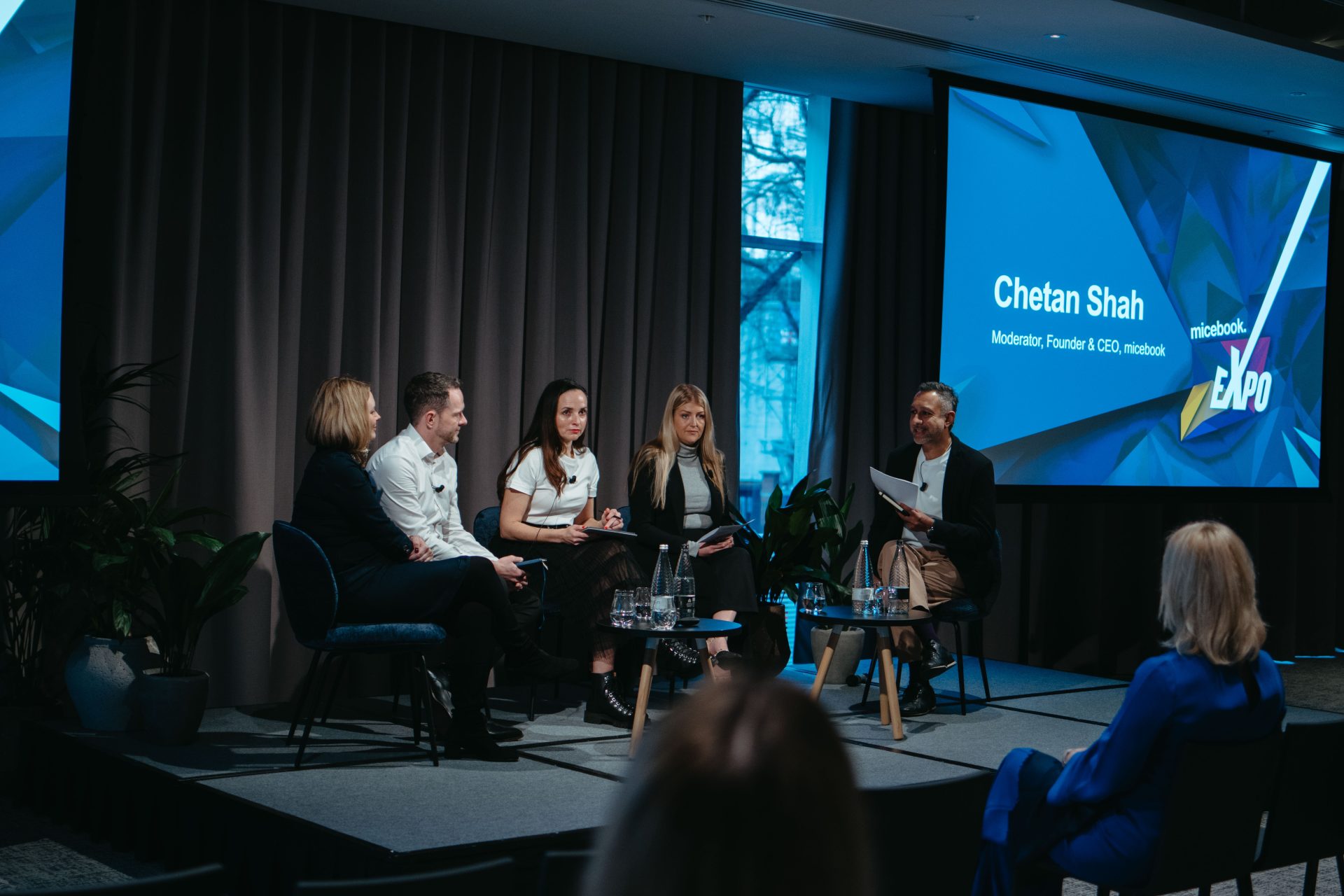Corporate event leaders came together to discuss the evolving challenges of event strategy, ROI measurement, and stakeholder engagement in a rapidly changing landscape at micebook EXPO 2025.
The session, “Future-Proofing Events: Strategies for Success in a Dynamic Landscape,” featured insights from James Gould, UK Head of Events, Zurich Insurance; Helen Barnes, Senior Events Manager, CACEIS; Charlotte Mitchell, Senior Events Manager, PwC; and Sarah Noakes, Senior Content, Sponsorship and Event Manager, AFME.
Here are the key takeaways from the session.
Event ROI is More Than Just Numbers
Measuring event ROI remains a challenge, especially when the primary objective isn’t always direct revenue generation. The panel emphasised that corporate event strategies should move beyond basic financial metrics and focus on long-term value creation.
Rather than looking at ROI in isolation, successful teams focus on:
- Audience engagement trends, such as pre-event interactions, post-event touchpoints, and long-term client relationships.
- Strategic alignment, ensuring each event ties directly into broader business objectives.
- Behavioural insights, tracking how attendees interact with content, sessions, and networking opportunities to measure impact.
- A shift toward “return on engagement” rather than just return on investment is helping teams better justify event budgets and demonstrate success to senior stakeholders.
Data-Driven Event Planning is Essential
The ability to analyse and act on event data is increasingly shaping decision-making. Corporate event teams are integrating deep audience analysis, real-time reporting, and CRM data to fine-tune event strategies.
By tracking delegate demographics, engagement levels, and conversion patterns, teams can reassess event formats, optimise marketing efforts, and ensure the right audiences are being targeted. Event professionals are also becoming more involved in business intelligence, working closely with internal stakeholders to align event planning with commercial priorities.
Another key trend is the use of technology to measure event performance, whether through mobile apps, AI-driven matchmaking, or sentiment analysis tools. These insights help businesses determine whether existing events are still delivering value or need rethinking.
Events Are No Longer One-Off Moments—They’re Part of an Ongoing Strategy
The discussion highlighted a growing shift away from standalone events toward long-term, year-round engagement strategies. Many organisations are moving toward a campaign-based approach, where events act as key touchpoints within broader customer and employee engagement strategies.
This means event teams are thinking beyond execution and focusing on:
- Sustained pre-event and post-event engagement through digital content and ongoing touchpoints.
- Personalised attendee experiences to maintain interest throughout the year.
- Stronger collaboration with marketing and sales teams to maximise event-driven business opportunities.
- The traditional one-day conference or annual flagship event is evolving into a more integrated, multi-channel experience that delivers lasting impact.
Gaining Influence with Senior Stakeholders
One of the biggest challenges for corporate event teams is securing a seat at the table with senior decision-makers. The panel emphasised that event professionals must position themselves as strategic partners rather than logistical coordinators.
The most effective ways to gain influence include:
- Speaking the language of the C-suite, using data and business-focused insights to demonstrate the impact of events.
- Aligning with commercial objectives and showcasing how events contribute to long-term business growth.
- Being proactive in presenting new event formats, audience insights, and engagement strategies.
- By positioning events as a key business enabler rather than a cost centre, corporate event teams can secure greater internal support and investment.
Sustainability & ESG Reporting Are Now Business Priorities
Sustainability in events is no longer a “nice to have”—it is becoming a core business requirement. Many corporations are embedding Environmental, Social, and Governance (ESG) principles into event planning, ensuring that sustainability metrics are factored into event reports.
Key actions include:
- Choosing sustainable venues and suppliers that align with corporate ESG goals.
- Tracking carbon footprint data and integrating it into event reports.
- Minimising waste and single-use plastics at in-person events.
- Prioritising virtual and hybrid models where possible to reduce travel impact.
- More companies are also embedding social impact initiatives within their events, such as community engagement projects, charitable partnerships, and inclusive programming.
Event professionals who proactively integrate ESG principles into event planning are more likely to gain buy-in from senior leadership and ensure compliance with corporate sustainability policies.
Agencies Must Evolve From Suppliers to Strategic Partners
The role of event agencies is also changing. Corporate event leaders are seeking deeper strategic collaboration with agencies rather than purely transactional relationships.
Companies are looking for agencies that:
- Offer insights on event innovation, audience trends, and emerging technologies.
- Act as business consultants, bringing fresh perspectives beyond logistics and delivery.
- Are proactive in problem-solving, helping corporates navigate challenges such as budget constraints, venue sourcing, and attendee engagement.
- Organisations that treat agencies as true strategic partners rather than just suppliers are seeing stronger collaboration and event impact.
Future-Proofing Events Requires Adaptability
The conversation made it clear that the events industry is evolving rapidly, and event teams must be agile in adapting to new challenges. Future-proofing event strategies means:
- Reevaluating event formats regularly to ensure they continue to serve audience needs.
- Embracing digital and hybrid models to increase accessibility.
- Investing in upskilling to stay ahead of emerging trends in audience engagement, sustainability, and data-driven planning.
- Collaboration across the industry—between corporates, agencies, suppliers, and tech providers—will be key to navigating this shifting landscape.
The session reinforced that events are no longer just brand experiences—they are powerful business tools that drive relationships, engagement, and long-term value. The challenge for corporate event professionals is to continuously prove their impact, align with broader business goals, and embrace new ways of measuring success.

